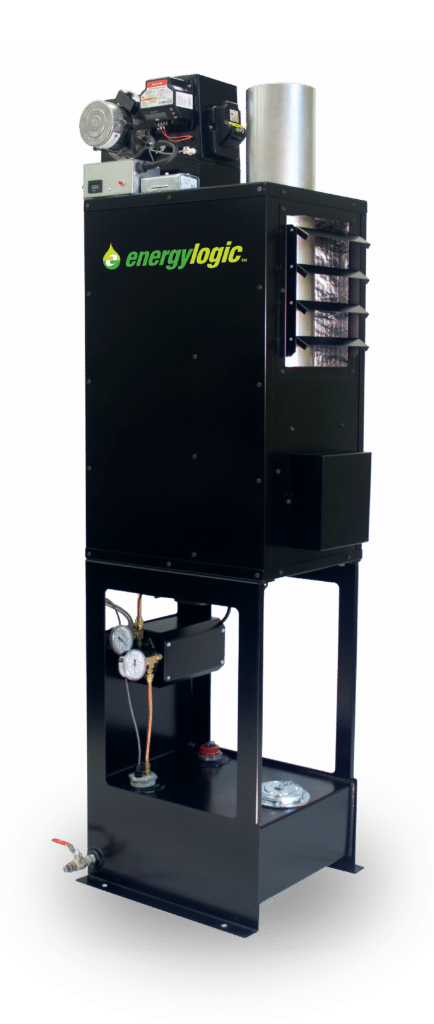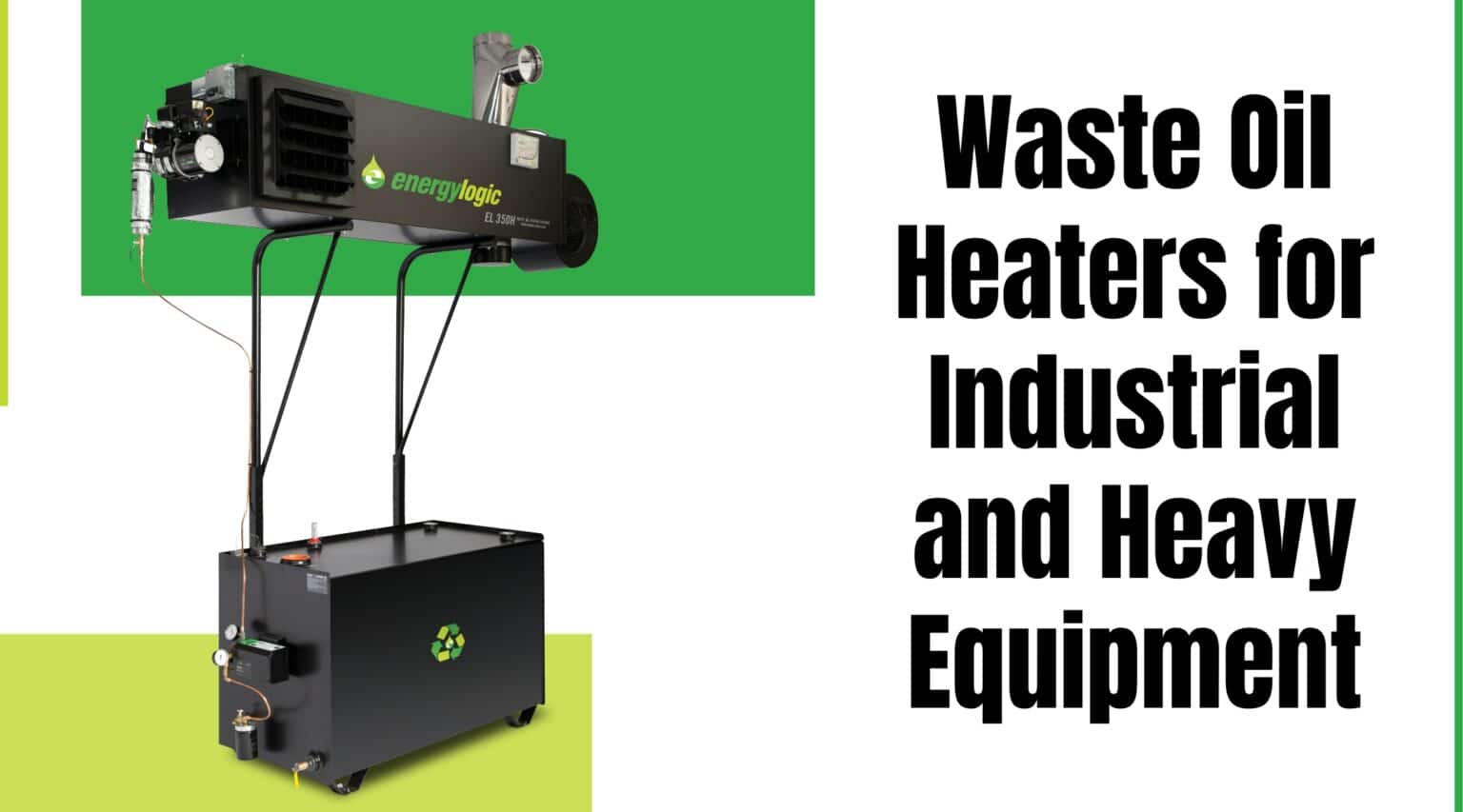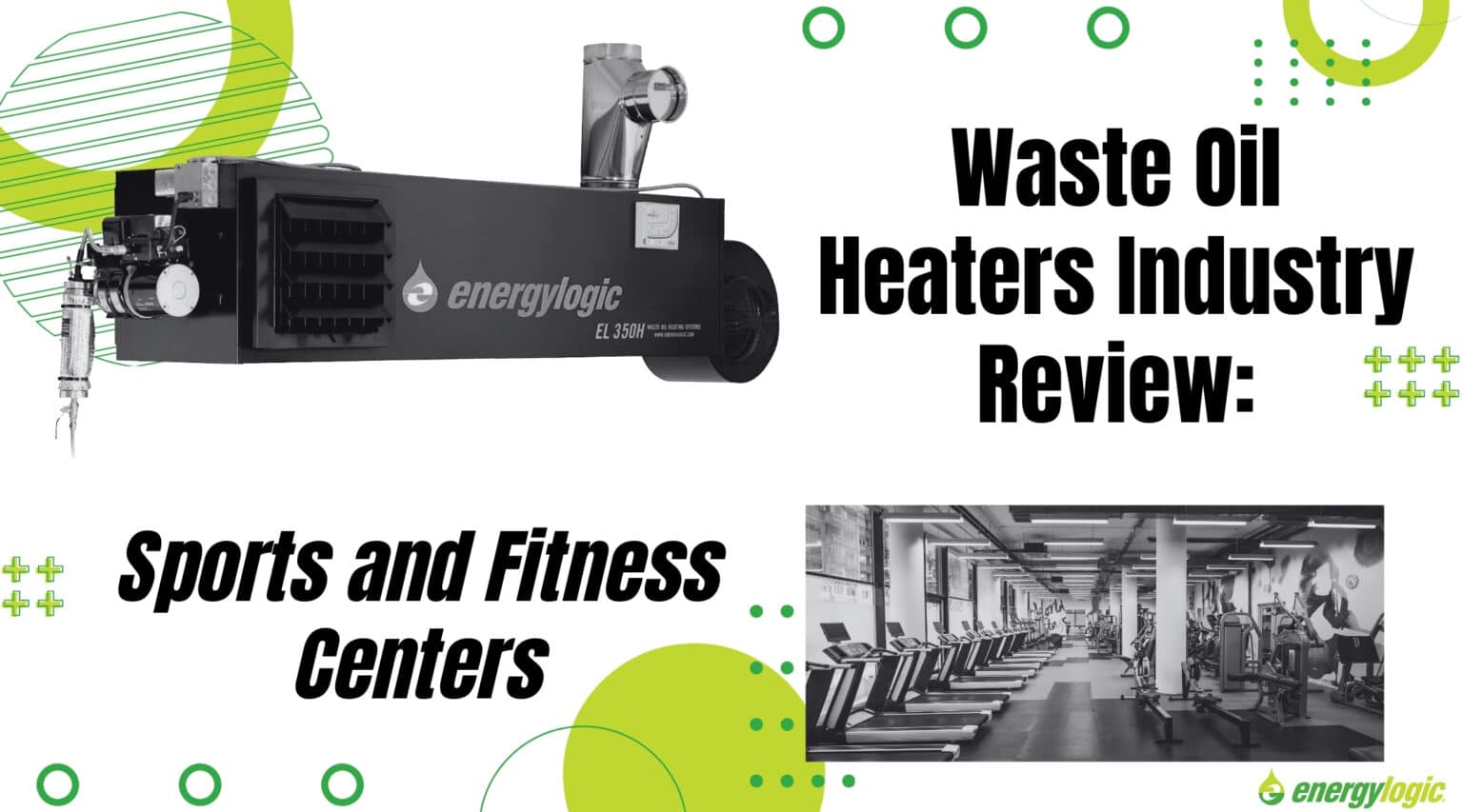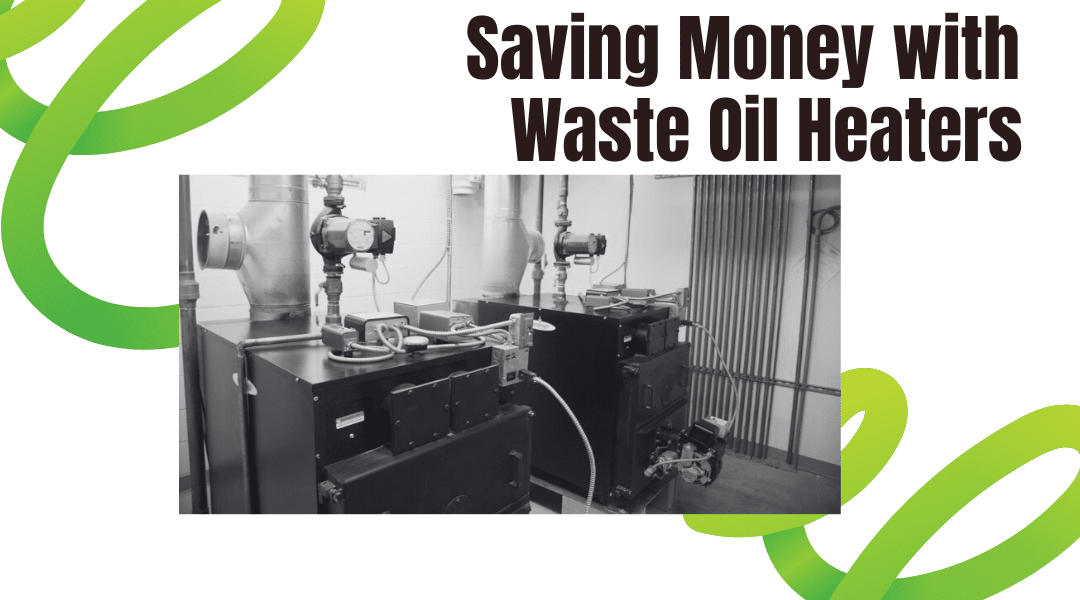The entire commercial farming supply chain relies heavily on machinery and equipment. The agricultural business uses tractors, combines, irrigation pumps, and trucks which are needed for planting, harvesting, and shipping crops to market. All these machines require fuel, which in turn generates millions of gallons of used motor oil each year.

Such a large output of waste oil has huge impacts on commercial farming operations, both negative and positive. Waste oil creates liability, disposal and management issues. However, reusing waste oil can also reduce energy costs for commercial farmers. Understanding waste oil impacts on commercial farming operations is vital for farmers to succeed in today’s challenging agricultural marketplace.
Waste Oil Can Negatively Impact Commercial Farmers
The agricultural industry faces a unique set of challenges when it comes to waste oil. For one, commercial farmers utilize a lot of large machinery and equipment, resulting in the production of vast amounts of waste oil. In turn, managing the proper disposal and recycling of waste oil becomes time consuming, expensive, and an added chore. From liability issues to disposal issues to management issues, waste oil can have a severe negative impact on commercial farmers’ day-to-day operations.
Liability Issues
Any commercial farm that produces more than 25 gallons of used oil per month is considered a generator of used oil by government standards. As a used oil generator, stringent standards come into play, making farmers responsible for the safe management of all the oil on their farms.
For example, the Environment Protection Agency (EPA) subjects large farms to specific used oil regulations:
- Generators must test their used oil, document that it has not been mixed with hazardous waste, and properly store it while it is on-site.
- Commercial haulers of such used oil must be permitted to transport used oil.
- Facilities that are in the business of storing or treating the used oil are also required to have permits.
- Generators are also responsible for the proper disposal of waste oil from cradle-to-grave.
On top of EPA requirements, state and local environmental agencies may also enforce additional, stricter liability requirements.
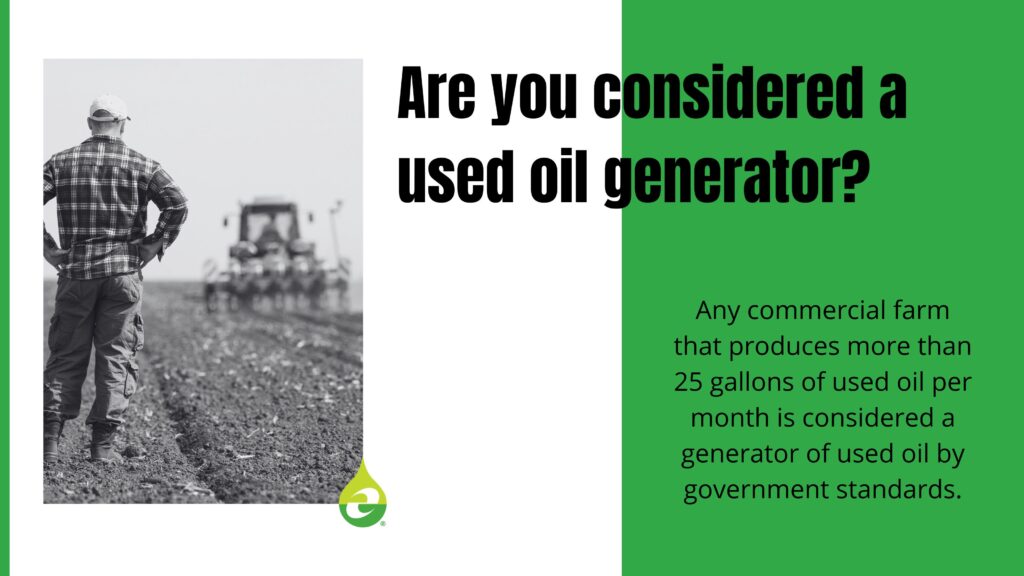
Disposal Issues
Legally, used oil must be properly disposed. Improper disposal can lead to enormous fines. Additionally, improper disposal of used oil can have enormous environmental consequences. In fact, just one quart of used oil can make millions of gallons of drinking water unfit to drink.
Generational practices have included easy disposal methods. Yet these practices are unlawful and not environmentally friendly:
- You MAY NOT use used oil as a wood preservative.
- You MAY NOT use used oil as a dust suppressant on farm roads.
- You MAY NOT use used oil as a livestock dip.
- You MAY NOT use used oil as weed control.
Any improper disposal can lead to soil and water contamination, an expensive clean-up operation, and becoming the subject of an enforcement action, which could include a substantial monetary penalty. This makes the old disposal methods unviable today.
Management Issues
Given the liability issues and the disposal issues it is easy to see how management of waste oil can create a time-consuming headache for already over-worked farmers.
Waste Oil Can Be Valuable to Commercial Farmers
Despite these challenges, commercial farmers do have a solution to these problems: burning used oil for energy production. In fact, burning waste oil turns it into an incredibly valuable resource that not only solves liability, disposal, and management problems but can save a commercial farm thousands of dollars in energy costs.
Burning Waste Oil is an EPA Approved Method of Reuse
Instead of hauling off waste oil or illegally disposing on-site, farmers can legally burn used oil for energy if they meet the following requirements by the EPA:

- The farmer burns only used oil that the farmer generates, or that is received from household do-it-yourselfer used oil generators;
- The space heater is designed to have a maximum capacity of not more than 0.5 million BTU per hour; and
- The combustion gases from the space heater are vented to the outside air.
Multiple Types of Waste Oil are Suitable for Waste Oil Burners
Every type of commercial farm, from livestock farms to fruit and vegetable farms to maple syrup and honey producers, has machinery and equipment that generates used oil during operations. Luckily most of the oil commercial farmers use is suitable for reuse in today’s high-tech, environmentally friendly waste oil heating systems.
Modern waste oil burners, such as the ones designed by EnergyLogic, can burn virtual all used oils with weights between 5 and 90, including synthetics including:
- Used crankcase oil 5w-90w (including synthetic)
- Used automatic transmission fluid
- ASTM D396 No. 2 fuel oil (including Diesel)
Waste Oil Can Deliver Cost-Effective and Reliable Heating and Hot Water
Livestock and produce farm buildings need reliable heating and hot water. However, many farm buildings are too large for standard residential grade heating and cooling solutions. Not only that, but rising energy costs are also adding a financial burden to commercial farmers. Luckily, waste oil heaters and boilers can provide affordable and reliable heating and hot water to farm buildings.
In fact, waste oil used in a high-quality system generates more energy than #2 fuel oil and has nearly twice the energy value of coal. For example, one gallon of waste oil is equivalent to 18kWh of electricity. That is enough energy to run an average household for approximately 15 hours. Thanks to advancements in technology, waste oil heaters and boilers offer an environmentally friendly and cost-saving method of managing the waste oil produced on commercial farms.
Fuel accounts for about 5% of farmers’ overall costs. That’s easy to see when that diesel powers 75% of all farm equipment, 90% of transporting farm products, and 20% of agricultural water irrigation systems in the United States. In fact, in 2020 US farms spent $7.1 billion on diesel alone according to the Department of Agriculture. If a by-product of all this fuel use (I.e., waste oil) can be used to offset other farming costs, it not only makes financial sense to do so, but it can also increase profit margins.
Waste Oil: Make It a Positive Impact on Your Commercial Farm Operations
Waste oil doesn’t have to negatively impact your commercial farming operations. Investing in a waste oil heater is one of the best additions farmers can make to their agricultural buildings.
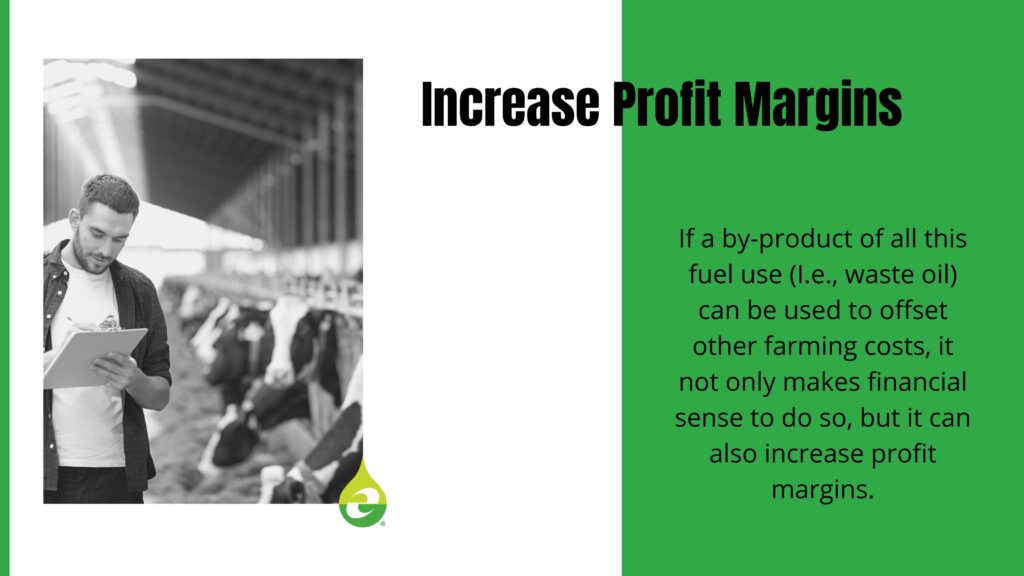
When installed in livestock barns, storehouses, and other buildings burning waste oil can have numerous benefits:
- Significantly reduces the inconvenience and liability of having waste oil properly disposed
- Reduces the environmental impact of potential waste oil spills and waste oil ground pollution
- Provides consistent, high-performance heating, and hot water
- Saves thousands of dollars annually in energy costs.
Contact EnergyLogic for more information on how waste oil impacts your commercial farm and on how a waste oil heating system could benefit your operations.
Sources:
https://farmersreviewafrica.com/waste-oil-heating-systems-for-the-agricultural-industry/
https://www.epa.gov/hw/managing-used-oil-answers-frequent-questions-businesses
https://rosefoundation.org.za/2020/01/06/used-oil-on-south-african-farms-polluting-the-environment/
https://www.agproud.com/articles/25496-how-to-manage-on-farm-waste-oil
https://www.ers.usda.gov/webdocs/publications/43756/37427_eib112.pdf?v=0
https://www.reuters.com/article/us-usa-fuel-farming-idUSKCN1IJ0CR
https://www.eenews.net/articles/farmers-face-expensive-spring-as-diesel-costs-surge/

